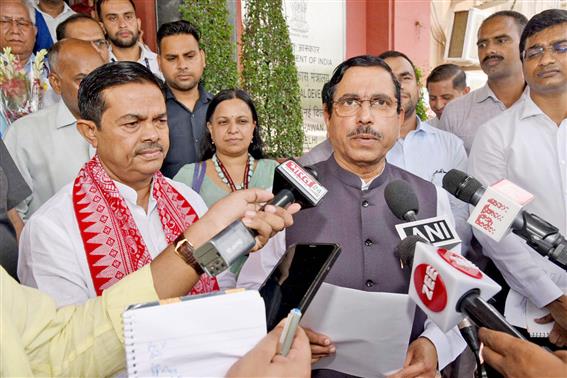New Consumer Protection Act Enhances Grievance Redressal Mechanisms
Department of Consumer Affairs is continuously working for consumer protection and empowerment of consumers by enactment of progressive legislations. With a view to modernize the framework governing the consumer protection in the new era of globalization, technologies, e-commerce markets etc Consumer Protection Act, 1986 was repealed and Consumer Protection Act, 2019 was enacted.
Section 90 and 91 of the Consumer Protection Act, 2019 provide for punishment for manufacturing for sale or for storing or selling or for distributing or importing any product containing an adulterant or spurious goods, which includes imprisonment or fine depending on the extent of injury to the consumer.
The Act provides for redressal of the grievances of consumer through specialized three-tier quasi-judicial agencies, now commonly known as ‘National Consumer Disputes Redressal Commissions (NCDRC)’ at National level, ‘State Consumer Disputes Redressal Commission (SCDRC)’ at State level, and ‘District Consumer Disputes Redressal Commission(DCDRC)’ at District level.
The Act also provides for, inter-alia, simplification of the adjudication process in the Consumer Commissions; filing of a complaint by a consumer in the Consumer Commission having jurisdiction over the complainant’s place of residence/work or where the cause of action arises, or the place of business or residence of the opposite parties, e-filing, virtual hearing, deemed admissibility of complaints, if admissibility is not decided within 21 days of filing; provision of product liability etc.
Provision for filing cases online through e-Daakhil has been introduced in NCDRC and Consumer Commissions of 35 States/UTs at the district and state level for speedy and hassle-free resolution of cases.
Video Conferencing facility has been provided in Consumer Commissions at National and State level considering the geographical spread of consumer commissions and the difficulties faced by consumers in attending hearings due to distance, time and cost implications. This initiative is in sync with the digital transformation of the Indian legal system bringing the justice at the doorstep of the consumer.
The Department of Consumer Affairs has revamped, the National Consumer Helpline (NCH) which has emerged as a single point of access to consumers across the country for grievance redressal at pre-litigation stage. It is available to all consumers of the country wherein consumers can register their grievances from all over the country in 17 languages (i.e. Hindi, English, Kashmiri, Punjabi, Nepali, Gujarati, Marathi, Kannada, Telugu, Tamil, Malayalam, Maithali, Santhali, Bengali, Odia, Assamese, Manipuri) through a toll-free number 1915. These grievances can be registered on Integrated Grievance Redressal Mechanism (INGRAM), an omni- channel IT enabled central portal, viz. WhatsApp, SMS, mail, NCH app, web portal, Umang app as per their convenience.
The Department is implementing an exclusive scheme namely “Consumer Awareness” to generate consumer awareness and empower the consumers under the aegis of “Jago Grahak Jago” campaign through various media including electronic, outdoor and social media. The Department in 2022-23 has launched “Jagriti”, a mascot for empowering consumers and generating awareness of their rights. The Department participates in prominent fairs/festivals/events where a large number of people may congregate. The Department also provides grant-in-aid to various States/UTs for generating awareness at local level.
Under the provisions of the ibid Act, 2019, the Central Consumer Protection Authority (CCPA) has been established w.e.f 24.07.2020 to regulate matters relating to violation of rights of consumers, unfair trade practices and false or misleading advertisements which are prejudicial to the interests of public and consumers as a class. Under Section 18(2)(1) of the Act, the CCPA is empowered to issue necessary guidelines to prevent unfair trade practices and protect consumers' interest.
The CCPA has notified the Guidelines for Prevention of Misleading Advertisements and Endorsements for Misleading Advertisements, 2022 on 9th June, 2022. These guidelines inter-alia provide for; (a) conditions for an advertisement to be non-misleading and valid; (b) certain stipulations in respect of bait advertisements and free claim advertisements; and (c) duties of manufacturer, service provider, advertiser and advertising agency.
Details of cases filed and disposed off during last five years is as follows:
Year | Cases filed during the year | Cases disposed during the year (also includes the cases disposed which were filed in the previous years) | Disposal percentage |
2019 | 178153 | 140860 | 79.06 |
2020 | 120018 | 60884 | 50.73 |
2021 | 148422 | 99095 | 66.77 |
2022 | 174280 | 183779 | 105.45 |
2023 | 171468 | 186902 | 109.00 |
This information was given by the Union Minister of State for the Ministry of Consumer Affairs, Food and Public Distribution, BL Verma in a written reply today in the Rajya Sabha.


